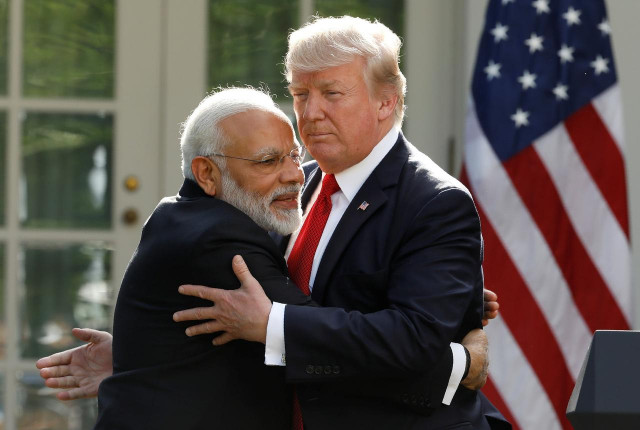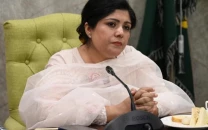India bet backfired, US should pivot to Pakistan: former NSA
Dr Moeed Yusuf warns US may lose all of South Asia if it sticks to a failing India-focused strategy

The United States’ long-standing strategic bet on India has failed to deliver, and Washington must now reconsider its South Asia policy by investing in a balanced partnership with Pakistan—one that could help stabilize the region and even bring the US and China closer—argues former Pakistani National Security Adviser Dr Moeed Yusuf.
In the piece titled “Why America should bet on Pakistan” published in the prestigious Foreign Affairs magazine, Dr Yusuf contends that the US has misread regional dynamics by overestimating India’s strategic value and underestimating Pakistan’s capacity to act as a balancing power. He urges Washington to course-correct, warning that continued overreliance on New Delhi risks further instability in an already volatile region.
“The US bet on India has not paid off. Instead of becoming a steadfast partner to counterbalance China, India has pursued an independent and often divergent foreign policy,” wrote Yusuf. “Meanwhile, Pakistan, despite its economic and security challenges, remains a critical regional player that could help the US recalibrate its approach to South Asia.”
Also Read: PM orders 300-day plan to tackle climate change: Musadik Malik
He noted that despite heavy US investment—ranging from civil nuclear deals to waivers on Russian arms purchases—India continues to resist aligning fully with American interests.
“Washington has courted New Delhi with major economic, defense, and technology deals while insisting that it is in American national security interests to facilitate India’s emergence as what US officials call a “net provider of security” in the wider Indian Ocean region,” Yusuf wrote.
Citing India’s neutral stance on Russia’s invasion of Ukraine and its growing ties with both Moscow and Beijing, Dr Moeed Yusuf noted that the Modi government’s foreign policy is driven more by a desire for “strategic autonomy” than a clear alignment with the US-led global order — a development that, he warned, should raise concern among US think tanks.
“Despite all these efforts, US policymakers should be alarmed by the results… For example, India took a roughly neutral position on Russia’s 2022 invasion of Ukraine and has participated in efforts by some non-Western countries to shift away from trade in US dollars. These divergences are not accidental; they are derived from India’s long-standing commitment to what it considers strategic autonomy in foreign policy,” former NSA added.
Read: President Zardari to embark on 10-day official visit to China
Yusuf, who served as NSA from 2021 to 2022, identifies three faulty assumptions that have defined US policy toward the region over the past two decades: the belief that India would unconditionally rise as a counterweight to China; that Pakistan would naturally align with Beijing; and that Pakistan, due to its record in Afghanistan, was an unreliable long-term partner.
He argues that these assumptions led Washington to isolate Pakistan and enable India’s aggressive posture in the region. This included limiting military cooperation with Pakistan, stalling economic support, and allowing India to frame bilateral tensions as internal matters beyond US concern.
Yusuf noted that Washington’s decisions aligned neatly with India’s goal of keeping Pakistan weak and isolated. This emboldened New Delhi to adopt a more muscular stance, escalating military strikes into Pakistani territory and deepening the regional divide.
According to Yusuf, India’s increasingly assertive actions—including targeted strikes inside Pakistan and a growing rhetoric of hostility—have only intensified Islamabad’s tilt toward Beijing. Pakistan, he points out, now sources 80% of its new arms from China, a dramatic shift from its once-Western-dependent military.
Despite deteriorating ties with the US in recent years, Yusuf highlights a shift in Washington’s posture under President Donald Trump, who made overtures to Islamabad’s military leadership and brokered a temporary ceasefire between India and Pakistan in 2025.
Also Read: 19 'militants' killed in separate operations in K-P
This thaw, Yusuf says, reflects a growing realization in Washington that its India-first policy has limited utility. He argues that Pakistan could be instrumental in creating a regional equilibrium—not just between India and Pakistan—but also in facilitating a more constructive US-China dynamic.
Yusuf wrote that Pakistan’s history as a bridge between Washington and Beijing—most notably during Henry Kissinger’s 1971 secret visit to China—shows it can again play the “role of regional fixer,” .
He notes that Pakistan’s 2022 National Security Policy explicitly rejects geopolitical bloc politics and promotes economic connectivity and regional cooperation. This vision, Yusuf claims, aligns with American interests in promoting stability, open trade, and counterterrorism efforts.
Former NSA emphasizes that Pakistan does not want to choose between China and the United States—and nor should it be forced to.
“Pakistan’s economy depends on both powers. Trying to push it away from China would backfire. Instead, Washington should work with Islamabad to create an environment of pragmatic coexistence,” he said.
He proposes that the US could reduce tensions over China’s investments in Pakistan—particularly the China-Pakistan Economic Corridor (CPEC)—by launching parallel or complementary infrastructure projects in the region. Yusuf suggests shared investments in regional connectivity could transform Pakistan into a commercial crossroads that benefits US, Chinese, and even Indian interests.
Read: Justice Shah again denied NOC to travel abroad
Moreover, cooperation in areas like counterterrorism and resource extraction—especially in critical mineral zones like Reko Diq—offers opportunities for collaboration that serve both American strategic goals and Pakistan’s development needs.
Yusuf warns that a continued US tilt toward India could exacerbate the risk of full-scale war in South Asia, particularly as India remains fixated on its rivalry with Pakistan. He highlights that New Delhi's confrontational policies have distracted it from its strategic competition with China and could overstretch its military capabilities, especially in the face of a potential two-front conflict.
He also underlines that improved relations with Pakistan could open doors for India to expand its access to Afghanistan and Central Asia—benefits that are currently lost due to a hostile stance.
Yusuf cautioned that unless the US encourages India-Pakistan dialogue to resolve longstanding disputes—from terrorism to Kashmir to water-sharing—the region will remain locked in a dangerous cycle.
As the US seeks to adapt to a multipolar world, Yusuf calls for a “realistic reset” in its South Asia strategy—one that does not treat India as the sole partner and acknowledges Pakistan’s indispensable role in ensuring regional peace.
“Only a balanced US approach—grounded in pragmatism and shared interests—can ensure long-term stability in South Asia and safeguard American influence in the region,” he concluded, warning that Washington’s continued India-centric policy risks not only alienating Pakistan, but forfeiting its strategic foothold in all of South Asia.

























COMMENTS (4)
Comments are moderated and generally will be posted if they are on-topic and not abusive.
For more information, please see our Comments FAQ